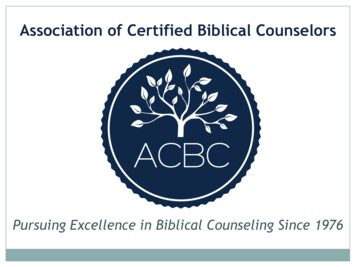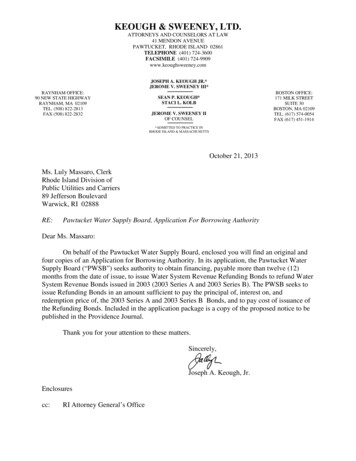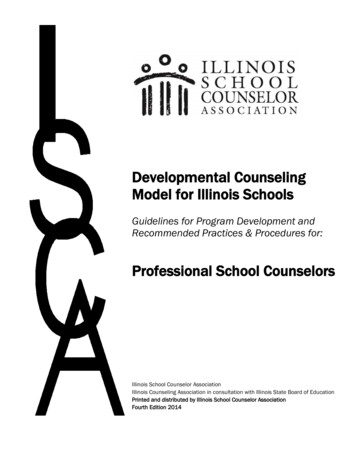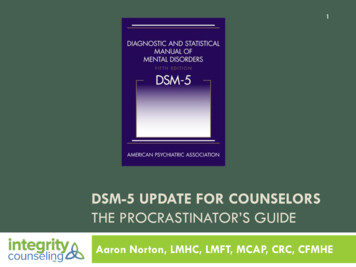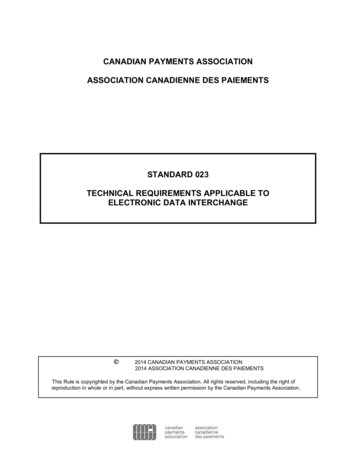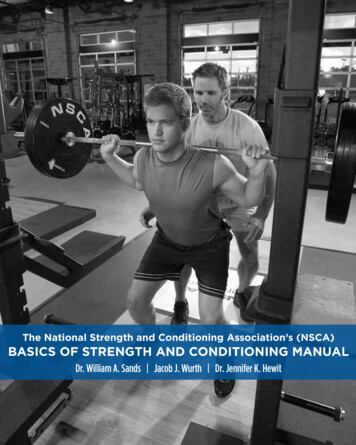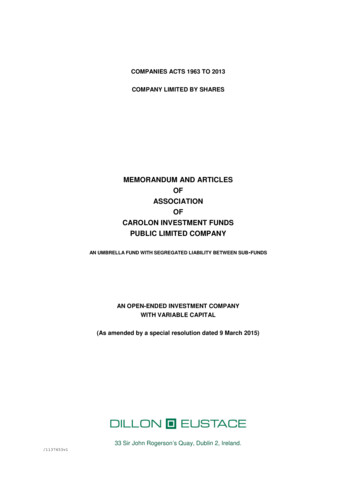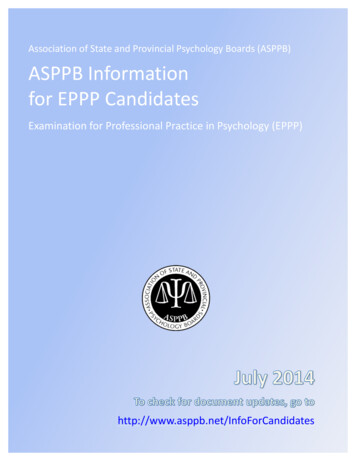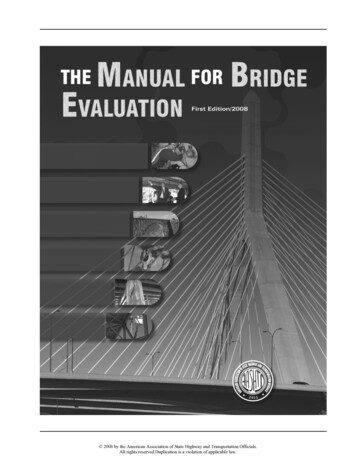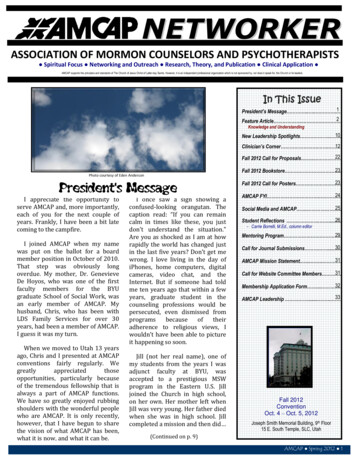
Transcription
NETWORKERASSOCIATION OF MORMON COUNSELORS AND PSYCHOTHERAPISTS Spiritual Focus Networking and Outreach Research, Theory, and Publication Clinical Application NETWORKERAMCAP supports the principles and standards of The Church of Jesus Christ of Latter-day Saints. However, it is an independent professional organization which is not sponsored by, nor does it speak for, the Church or its leaders.ASSOCIATION OF MORMON COUNSELORS AND PSYCHOTHERAPISTSIn This Issue1President’s Message . . . . 2 Spiritual Focus Networking and Outreach Research, Theory, and Publication Clinical Application Feature Article . . .Knowledge and Understanding10New Leadership Spotlights . . . 12Clinician’s Corner . . 22Fall 2012 Call for Proposals . . AMCAP supports the principles and standards of the Church of Jesus Christ of Latter-day Saints. However, it is an independent professional organization which is not sponsored by, nor does it speak for, the Church or its leaders.23Fall 2012 Bookstore .Photo courtesy of Eden Anderson23Fall 2012 Call for Posters I appreciate the opportunity toserve AMCAP and, more importantly,each of you for the next couple ofyears. Frankly, I have been a bit latecoming to the campfire.I joined AMCAP when my namewas put on the ballot for a boardmember position in October of 2010.That step was obviously longoverdue. My mother, Dr. GenevieveDe Hoyos, who was one of the firstfaculty members for the BYUgraduate School of Social Work, wasan early member of AMCAP. Myhusband, Chris, who has been withLDS Family Services for over 30years, had been a member of AMCAP.I guess it was my turn.When we moved to Utah 13 yearsago, Chris and I presented at AMCAPconventions fairly regularly. Wegreatlyappreciatedthoseopportunities, particularly becauseof the tremendous fellowship that isalways a part of AMCAP functions.We have so greatly enjoyed rubbingshoulders with the wonderful peoplewho are AMCAP. It is only recently,however, that I have begun to sharethe vision of what AMCAP has been,what it is now, and what it can be.I once saw a sign showing aconfused-looking orangutan. Thecaption read: “If you can remaincalm in times like these, you justdon’t understand the situation.”Are you as shocked as I am at howrapidly the world has changed justin the last five years? Don’t get mewrong. I love living in the day ofiPhones, home computers, digitalcameras, video chat, and theInternet. But if someone had toldme ten years ago that within a fewyears, graduate student in thecounseling professions would bepersecuted, even dismissed fromprogramsbecauseoftheiradherence to religious views, Iwouldn’t have been able to pictureit happening so soon.Jill (not her real name), one ofmy students from the years I wasadjunct faculty at BYU, wasaccepted to a prestigious MSWprogram in the Eastern U.S. Jilljoined the Church in high school,on her own. Her mother left whenJill was very young. Her father diedwhen she was in high school. Jillcompleted a mission and then did 24AMCAP FYI . . 25Social Media and AMCAP . .26Student Reflections . .- Carrie Borrelli, M.Ed., column editor29Mentoring Program . .30Call for Journal Submissions . .31AMCAP Mission Statement. . . .31Call for Website Committee Members .32Membership Application Form . .33AMCAP Leadership . . .Fall 2012ConventionOct. 4 – Oct. 5, 2012Joseph Smith Memorial Building, 9th Floor15 E. South Temple, SLC, Utah(Continued on p. 9)AMCAP Spring 2012 1
Feature Article - Feature Article – Feature Article – Feature ArticleTimothy Smith, Ph.D.SummaryDr. Timothy Smith, AMCAP member and Professor at BYU (Provo), had the opportunity toteach at Uganda University on a Fulbright award from August 2010 to August 2011. He and hisfamily members had many experiences that helped them gain an even greater appreciation foreducation and for the blessing of being able to see faith and goodness in others. During their stayin Uganda, Dr. Smith and his family founded a charitable organization called ―Uniting Children(Uganda)‖. This article is a compilation of excerpts from Dr. Smith’s blog and is featured withhis permission. For more information visit: revealedthroughfaith.wordpress.comDreams Come TrueAugust 9, 2010. In February of 2009, I anticipated the release of the list of 2010-11 Fulbrightawards. When the online posting appeared, three were specific to my profession. One was toMoldova, I believe, and another to Slovakia. English would be necessary for my family, so I clickedon the link to Uganda. The description was thin, but Uganda Christian University was listed as oneof the host institutions. Intrigued, I searched online. As the UCU home page came up on the screen,a feeling of excitement mixed with curiosity and certainty poured over me. This was it.I had planned for five years to apply for a Fulbright in 2009. My service as bishop of our church wascoming to an end, and Brigham Young University would support a sabbatical year away fromcampus. It was time.Dreams form slowly but then gather momentum. As a missionary in Chile more than 20 years ago, Iremember scheming of how I could return someday to help struggling university programs. MyFulbright application in 2002 to Chile was not successful, but the dream persisted. There would beanother opportunity.This morning I packed up my work and then spent precious moments with my family. Thechecklists, the airport, and the tender last hugs were the substance of today. But tonight as I squirmand sporadically attempt to sleep in seat 40E, I have begun the dream.AMCAP Spring 2012 2
Feature Article - Feature Article – Feature Article – Feature Article(continued)I Have a QuestionAugust 14, 2010. ―Dad, I have a question,‖ McKay asked. What is happening? Where are we going?When will we get there? What will happen after that? Then what? Questions poured from my 10year-old son as a driver from Uganda Christian University transported us along the crowded two-laneroad from Kampala to Mukono. Small shops lined nearly the entire route, with motorcycles dartingbetween smoke-belching vehicles that did not particularly attend to the median line had there beenone. People milled along the side of the road, right next to the chaos on the pavement. Shacks andcement buildings of limited construction spread out in every direction.It was the real Uganda, the one former visitors had described but not as I had imagined. Our arrival tothe University was exceptionally pleasant, with the matron of the guesthouse feeding us lunch andshowing us around the campus. She and the driver were saintly in their praises of my son Eric’sattempts to learn Luganda (the language spoken in this region). In the afternoon we walked to thecenter of Mukono, becoming part of the many marching along the pavement beside the rows of smallshops. ―Dad, I have a question,‖ asked McKay. That leg hanging from metal hooks, is it a cow? Whyare they burning piles of garbage? Why does that policeman carry a rifle?We arrived at the chapel of the Church of Jesus Christ of Latter-day Saints, the destination of our firstexploratory walk through Mukono. To my surprise the gates were open, as was the door. We enteredto find a small meeting in progress, and a woman came out and invited us to join them. At theconclusion of the meeting, we sang ―Onward, Christian Soldiers‖ and the words ―we are not divided;all one body we‖ brought instant tears to my eyes: Along the road today, I had repeated, ―Father, Ihave a question.‖ Where am I going? What will happen? Then what? As I sang the hymn, I wasreminded that, yes, there will be chaos along the way, but at the end of our life’s journey the gateswill have been opened and the doors also. We will be invited in, and we will join them. And Fatherwill answer all of our questions.First Day of TeachingAugust 17, 2010. ―Someone has stolen the sockets,‖ explained the program director as to why I couldnot set up the digital projector. I looked around, and sure enough, two bare wires poked from a smallhole in the wall. A few dry leaves and wood shavings decorated the floor. We relocated to a smallerroom with an intact electric socket.AMCAP Spring 2012 3
Feature Article - Feature Article – Feature Article – Feature Article(continued)room with an intact electric socket.The twenty students in the graduate level research methods class were very friendly and tried theirbest to understand my terribly thick accent. I love them already.What is higher education? It certainly has little to do with the classroom. It is not the technology, nomatter how useful. Today I met students with a desire to learn. And they will learn. Their education isin their hands.Alpha and OmegaSeptember 9, 2010. End of chapter 1 of our time in Uganda. Chapter 2 will start in January when wereturn.One month ago, we started our journey to Uganda not knowing what we would experience. Tonightas we arrived at the Entebbe airport, we have completed this part of our journey.At first, we had only imagination. We now have memories.In the beginning there was anticipation. Now there is confirmation.Initially, we hoped to meet people and learn from them. We treasure now the friends found here.From start to finish, our experiences surpassed expectations.The slogan of Uganda Christian University, Alpha and Omega, appears prominently over the mainentry gate. It is meant to remind students and faculty that God is the first and the last, the beginningand the end. In our experiences here, we have come to know that God is there the entire time.Things Not SeenFebruary 8, 2011. I had previously been to Uganda with our two sons, but today our whole familyflew to Entebbe. From across the aisle Cindy smiled at me. I asked her what I could do to preparethe family for the shock they were about to experience. She reassured me that all would be well. Hersmile expressed absolute trust. The airplane was descending.AMCAP Spring 2012 4
Feature Article - Feature Article – Feature Article – Feature Article(continued)Long lines to obtain visas. Armed military guards and mandatory baggage inspection in anticipationof the national election next week. Humid heat even at midnight. Disorder in the dark parking lot.Swarming mosquitoes. No seat belts in an antiquated transport van. Mile after mile of shantytowns.Dirt and disrepair. Unsightly scenes out every window. Reality.Cindy smiled. It was a different smile. She felt the shock of a cold shower at 70 km/hour. ―I neverwould have let you come,‖ she said but then winked. Her smile expressed informed faith. Ugandahad not changed within the past hour – she had. Alignment with actuality. Devotion despite reason.Reality.Children believe in God. Innocent faith. At some point in time, experiences challenge beliefs.Informed faith learns from experience. The universe does not change – we do. Assurance of thingshoped for. Evidence of things not seen. Reality.Love and HateMay 19, 2011. Before coming to Uganda last August, I solicited advice from several Fulbrightscholars who had been here the previous year. One of them said simply, ―You will love it, and youwill hate it. Prepare for extremes.‖Most days I have loved it. Occasionally I become frustrated. Sometimes I wonder if I have done anygood at all. Today was one of those days. I started grading an examination that I had given in classtoday. Most students struggled to apply the material. Or they had been too polite to say that they hadfailed to understand my thick accent. Irrespective of the reasons for the students’ performance, I wasfighting with despair. I had come to UCU to support the students in their research, and I had failed.Then in the afternoon, the students from my previous class invited my family and me to visit theirclassroom. Most of them had successfully passed their research proposals, and they wanted toexpress appreciation through some gifts to us. I had never before received so much gratitude. Theyfelt my love for them, and they returned that love. With African enthusiasm, the students prayed andsang with hands raised in praise to God. I consider that moment with those students worth everyeffort we have made to come here.I later reflected on the fact that this same group of students had largely failed in their initialperformance eight months ago. I wondered if I had done any good at all. I fought against despair.AMCAP Spring 2012 5
Feature Article - Feature Article – Feature Article – Feature Article(continued)When you give your heart, prepare for extremes.We are All BeggarsMay 27, 2011. Four ragged boys approached me on the street, ―You give us money.‖ They ranged inage from six to ten. They were dirty and undernourished, but they were not street children. Theywere likely from families that could not or did not pay for uniforms and school fees (about 40 peryear). These children clearly did not have any money, and I clearly did. It was a simple request froma simple source. But giving is not so simple.On my first visit to Uganda, I had given money to a begging child who looked exactly like theseboys. A Ugandan friend scolded me, ―Why did you give him money? He may never go to school.Why would he go to school when he can stand here and get money from tourists?‖ Ouch.I wish that my mistake could be undone, but the scale of the damage is so vast that it cannot becounted. Billions of dollars of foreign aid have improved conditions in Uganda, but they have alsofostered dependency on foreign aid. For instance, some subsistence farmers wait for free seedsbefore they will plant, so they go hungry by failing to save seeds from their own crops.Poverty alone does not produce dependency. Congo has received less foreign aid than Ugandabecause of political instability. The people suffer from many hardships, but some do reasonably wellin certain essential aspects – precisely because they cannot depend on donations from outsideagencies. Aid is absolutely necessary when resources are unavailable, but after the basic resourceshave been provided, self-reliance is the next essential commodity. A farmer cannot work withoutseeds, but after seeds have been provided once, instruction should replace donation.At the very time the four ragged boys approached me on the street, I was thinking about selfreliance. Just a few minutes earlier, a Ugandan friend had asked me to solve a problem for him, and Ihad given what he asked. As I walked along the street, I was feeling disturbed that this friend hadgotten into the habit of expecting something from me every time we were together. I had fostered hisdependency.So I determined to try a different strategy with these four ragged boys. I asked them to follow me toa store nearby. I spoke with the owner and asked him if he had any work that the boys could do forabout an hour. He did. I explained that I would give him the money to pay for their work. Theowner started talking to the boys, and I left them to their work.AMCAP Spring 2012 6
Feature Article - Feature Article – Feature Article – Feature Article(continued)about an hour. He did. I explained that I would give him the money to pay for their work. The ownerstarted talking to the boys, and I left them to their work.I do not know the outcome, but I do know that these boys’ problems are systemic. They are caught ina system. It is estimated that more than half of all school fees in Uganda are paid by foreign aidorganizations. I personally believe that education is one of the greatest investments that we can make,but even this type of financial support has unintended consequences: Many parents who find asponsor to pay school fees see no need to save money for next year’s fees, so they do not. Someparents who do not find a sponsor this year hope that they will find one next year, so they do not saveeither. These four boys will likely never further their education. They are trapped in a system, needintensified by dependence.I believe that God wants us to give. He gives to us. He expects us to share what we are given. A fewweeks ago, I was holding a clear plastic bag that had the remnants of my lunch, some crumbs ofbread. A girl nearby asked for the bag. She was that hungry. I had crumbs. I can give. Simplesolution. But giving is never simple. As soon as I had given her the bag, three boys approached andasked for some food. I did not have any more, so I asked the girl to share what little there was withthem too. She clutched the bag tightly, so the boys attempted to take it away from her. I stopped thefight by taking back my bag, crumbs intact. I told the girl that she could have shared, even though itwas little, and I told the boys that they should not take what was not theirs. I tried to teach them.What none of them knew was that a lunch had been prepared for them. I escorted them to the meal,and they feasted. I later reflected on how this experience may be somewhat like what God does withus. He gives, but He expects us to share, even when we have little. He teaches us to not take whatothers have been given. If we apply these lessons, our needs will be supplied. We are all beggars.We may fight over crumbs, but there is a feast prepared if we follow Him.God shows us how to give correctly to one another. We can learn from His example. He loves us butdoes not give us everything that we ask. He does not remove the painful consequences of our choices.Rather, God gives in ways calculated to help us progress. We are pathetically impoverished in truthand goodness, but God sees that we are capable of sacrifice, of sharing, of creating opportunitiesourselves. Giving is a responsibility. We must give responsibly. The efficacy of our giving dependson our ability to foster that same spirit of giving in others. That is no simple task. It requires acomplete shift in paradigm. Giving responsibly entails intensely hard work.AMCAP Spring 2012 7
Feature Article - Feature Article – Feature Article – Feature Article(continued)Final PostAugust 10, 2011. A curtain is closing on a chapter of our lives, and we endure the pain that comesfrom loving too much to leave.The curtain will remain partly opened because our family started a charitable organization that willcontinue after we return to the U.S. Working with local people, we received government approval toprovide aid to children with disabilities in Mukono. The projects include assisting families unable toafford school fees and providing physiotherapy to help young children learn to walk. Typicallychildren with disabilities in Uganda remain housebound; their parents cannot afford corrective therapyor surgery. We met children who had spent their entire lives in a small hut. Without the ability towalk, the children cannot attend school. They remain isolated, shut away from the world outside theirdoor.Our daughters named the organization ―Uniting Children (Uganda)‖ because they want children withdisabilities in Uganda to experience social interaction and receive an education. They have alreadyseen success. A child who took his first steps with them cried to see them leave. That child willcontinue to receive treatment, but there are many others in need of assistance.We have seen how God answers prayers through other people moved by compassion. We have nocomprehension of hunger, sickness, or violence, but we have seen over and over again that God does.He loves too much to ever leave us. The curtain remains partly opened.TimSmith,Ph.D.,isaProfessorofCounseling Psychology at Brigham YoungUniversity.Hisresearchfocusesonmulticultural psychology and the psychologyof religion. He is a fellow of the AmericanPsychological Association and is currentlyworkingonabookonmulticulturalpsychology to be published by APA.AMCAP Spring 2012 8
(Contiued from p. 1) her undergraduate degree at BYU. Jill was a verybright, accomplished student and, given thedifficulties she
accepted to a prestigious MSW program in the Eastern U.S. Jill joined the Church in high school, on her own. Her mother left when Jill was very young. Her father died when she was in high school. Jill completed a mission and then thdid (Continued on p. 9) Photo
